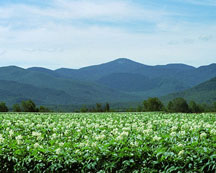The Uihlein Potato Research Station of Cornell University is the official seed potato farm in New York State. Located about two miles south of Lake Placid, the farm was donated to the university in 1961 by Mr. and Mrs. Henry Uihlein II. Their purpose was to establish a site for the production of basic potato seed stocks for the New York potato industry.
The farm’s location – geographically isolated from heavy commercial potato production and in a colder, 80-day growing season climate – and the farm’s use as a potato farm are by design to help keep the potatoes disease-free.
In 1977, the Uihleins provided funding to build the Henry Uihlein II Laboratory. The tissue culture laboratory is unique in its location on a potato farm. Commercially-sold potatoes originate from test-tube plants that have started in a test tube in such a lab.
A 125-foot greenhouse adjoins the laboratory that is used to develop disease-free nuclear seed stocks of commercial varieties of potatoes. Plantlets are tested and thoroughly screened for disease-causing micro-organisms, including bacteria, fungi, and viruses. A focus of the program in recent years has been to develop cultivars and new varieties that are resistant to the golden nematode.

The farm has approximately 175 tillable acres. Sixty to 70 varieties of potatoes are grown here each year. Most of the potatoes are planted on contract for commercial entities or to produce foundation seed for the U.S. Department of Agriculture for use in other states. The rest of the potatoes grown here represent research lines from breeding programs at Cornell University and elsewhere.
Learn more: http://www.cals.cornell.edu/cals/plpath/about/facilities/uihlein/index.cfm.
